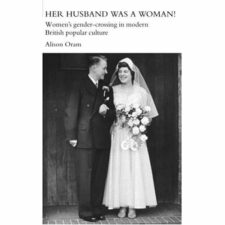 Catherine Rew, nee McFadyen, was a missionary in what is now the Democratic Republic of Congo in central Africa for over fifty years. She was born into a lower-middle class family in Renfrew, near Glasgow. Her father was the station master at Glasgow Central station and her mother was a nurse, and later a mid-wife. As a young adult in the 1940s, Catherine or Cathie felt called by God to become a missionary to what was then known as the Belgian Congo. To pursue this vision, she trained as a teacher, before going to live in Belgium for two years to learn the language and to get the required qualifications to work in a Belgian colony. Her family were resistant to her choices, imagining that she was not physically fit enough for the rigours of African life; while her conversion to the Brethren Church upset their Presbyterian values. Yet, if Cathie was anything, it was stubborn and her determination was marked in her drive to fulfil her calling.
Catherine Rew, nee McFadyen, was a missionary in what is now the Democratic Republic of Congo in central Africa for over fifty years. She was born into a lower-middle class family in Renfrew, near Glasgow. Her father was the station master at Glasgow Central station and her mother was a nurse, and later a mid-wife. As a young adult in the 1940s, Catherine or Cathie felt called by God to become a missionary to what was then known as the Belgian Congo. To pursue this vision, she trained as a teacher, before going to live in Belgium for two years to learn the language and to get the required qualifications to work in a Belgian colony. Her family were resistant to her choices, imagining that she was not physically fit enough for the rigours of African life; while her conversion to the Brethren Church upset their Presbyterian values. Yet, if Cathie was anything, it was stubborn and her determination was marked in her drive to fulfil her calling.
Cathie arrived in the Belgian Congo when she was 24 and became part of the missionary base at Katoka established by William and Margaret Rew twenty years earlier. The base was established to bring Christianity to the area, but it also provided vital services including a hospital and a school to a very remote part of the Congo. The missionary base required a pretty basic existence- the missionaries grew their own food, raised their own animals, built their own homes, and lived without most modern luxuries. Even today, electricity is provided by a generator that is only switched on for a few hours in the evening. Yet, like many missionary endeavours, they were determined to have some semblance of ‘civilisation’ in rural Africa. As a result, they had strict meal times where the base came together to eat; they insisted on sitting properly at the table, and maintaining ‘British’ manners and decorum, including hierarchical social relationships- even as these went out of fashion in the UK. Despite learning to drive in the UK, Cathie never drove in Africa, waiting for her husband to be able to take her from place to place. At the same time, their local neighbours were not without influence, as the missionaries adapted to eating African foods, speaking the local dialect of Chokwe, and learning their stories and traditions.
The Rews had 7 children, of which six survived to adulthood (the latter six were all born in Africa). In the 1950s, they were of similar age to Cathie and several remained on the base, including Kathleen (married to Dudley Dalton), Margaret (married to Gordon Jones) and William Rew, jnr. Cathie started working in the school (which was eventually taken over by the government), becoming head-teacher. She taught women and children to read, write and to sew, as well as teaching the bible. The Joneses and the Daltons eventually moved to other parts of Africa to continue their missionary work, but Cathie and William remained at Katoka. In 1956, Cathie married William Rew, jnr. They had five children: Katherine, Billy, Ruby, Elspeth and Grant.
Cathie continued to work throughout her children’s lives. She preferred to give birth in Africa, hating the idea of giving birth in hospital with all their rules and restrictions. Cathie was helped by a Chokwe nanny who cared for the children, while she taught in the School, returning home to breastfeed during intervals in the school day. When her children turned five, they were sent to boarding school in nearby Zambia, and as teenagers to Rhodesia (now Zimbabwe), returning home to Katoka in the holidays. When the eldest child Katherine reached age to go to college, the Rew children were sent to Britain, where they lived with another family while they trained or went to school. Grant, the youngest, was only 10. From this period, the children only saw their parents when they came home on furlough, every five years or so- staying for about a year at a time. Once their children were older, they often stayed in their homes when visiting; after Katherine and Ruby emigrated to New Zealand, they would occasionally visit there.
Despite these trips back to the UK, their home was in Katoka and they remained there through its turbulent history. In the 1950s, a growing nationalist movement grew in the Congo and they gained independence in 1960. Following this, the country was marked by several periods of unrest (not least in recent years), during which missionary colleagues in other parts of the country were forced to leave, or in one instance even executed. In 1977, violent uprisings in their region forced William and Cathie to leave Katoka as refugees. They lived in a refugee camp in Angola on dried biscuits for three months, before managing to get to the UK. Yet, they returned to Katoka as soon as they were permitted. Over her life, Cathie was involved in helping abandoned children, landmine victims and other war survivors at their base in Katoka. One of her success stories was of a small premature baby, whose mother died in childbirth, that she kept in a shoebox next to her kitchen fire, feeding him small drops of milk to ensure his survival (in a country without incubators or other medical technologies). Today, he is a leading member of the church and missionary community at Katoka.
Catherine Rew died at home in Katoka in November 2009. She was followed by her husband William in the spring of 2010. Her legacy in Africa remains as her colleagues and a new generation of missionaries continue to run the base in Katoka, maintaining the hospital and school, as well as operating as a base for a new generation of aid workers.
A number of years ago, Catherine Rew did an oral history with her daughter Katherine, discussing her early life up until her marriage with William. A transcript of this interview will follow on Wednesday.
Katie Barclay is the grand-daughter of Catherine and William Rew. She is a historian at the University of Queen’s Belfast.


1 thought on “Catherine Jane Rew (1926-2009)”
Comments are closed.